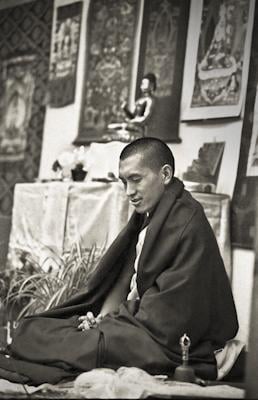The Index Page provides an outline of the topics discussed in each of the lectures.
- The imprint exists but only as a mere label
- No matter where we look, we can’t find the I
- We can’t even find the I that exists
- Our illusioned mind causes us to suffer
- Satisfaction only comes from seeing beyond this life
- The three types of suffering come from holding the I as truly existent
- We must meditate on the emptiness of things in our daily life
- Coming here is the most important thing in your lives
- Conventional nature and impermanence
- The happiness of future lives is more important than the happiness of this life
- With the perfect human rebirth we can achieve the four Mahayana Dharma wheels
- Understanding how precious this life is stops thoughts of suicide
- The path of the lower scope practitioner stops the eight worldly dharmas
- Causative phenomena are like a star, a butter lamp etc.
- Food offering
Lecture Three: December 7, 2010
- Meditating on the object of refutation while walking
- “Taking care of ourselves” means practicing the Dharma
- The real I is not findable
- Between eternalism and nihilism
- The fear of nearing emptiness
- Tea offering
- Correctly searching for the I (cont): The fear of falling into nihilism
- Realizing the two truths saves from nihilism
- Geshe Jampa Wangdu: Emptiness and bodhicitta
- The story of Geshe Jampa Wangdu
- To develop lam-rim realizations we need bodhicitta
- The guru is dharmakaya: The first verse Praise to Shakyamuni Buddha
- Yamantaka appears as a butcher
- All happiness comes from the guru
- Praise to Shakyamuni Buddha (back to)
Lecture Four: December 8, 2010
- Doing a hundred things, but the one important one: renouncing the self
- Buddhas do not have a dualistic view
- Oral transmission of “Chenrezig’s Request to the Buddha”
- Oral transmission: The meaning of the Buddha mantra
- Khunu Lama Rinpoche’s story
- Oral transmission: The pronunciation of the Buddha mantra
- Oral transmission: The Prajnaparamita Sutras
Lecture Five: December 9, 2010
- Liberating animals
- The importance of a good heart
- The four suffering results of karma
- The need for purification
- Liberating animals
- The power of the Golden Light Sutra
- The four harmonious brothers
- The importance of a good heart
- The Sixteen Human Dharmas
- The seven-limb practice
- Seven-limb: Prostration
- Seven-limb: Offering
- Seven-limb: Confession
- Seven-limb: Rejoicing
- Seven-limb: Entreating
- Seven-limb: Requesting
- Seven-limb: Dedication
Lecture Seven: December 11, 2010
Lecture Eight: December 11, 2010
- The six types of suffering: Nothing is definite in samsara
- The six types of suffering: Nothing gives satisfaction in samsara
- The bodhisattva’s motivation
- The six types of suffering: We have to leave this body again and again
- The six types of suffering: We have to take rebirth again and again
- The six types of suffering: We go forever from higher and lower in samsara
- The six types of suffering: We have to die alone
- Motivation for the refuge ceremony
- Refuge vows
- Dedication
- Refuge in the Buddha: What to practice and avoid
- Refuge in the Dharma: What to practice and avoid
- St Francis
- Refuge in the Dharma (back to)
- Refuge in the Sangha: What to practice and avoid
- General advice on what to do and avoid with refuge
- Vajrasattva initiation
- Vajra Armor transmission
- Red Tara initiation





























